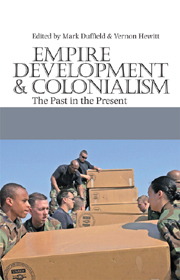Book contents
- Frontmatter
- Contents
- Acknowledgements
- Notes on Contributors
- Introduction
- 1 The Exceptional inclusion of ‘Savages’ & ‘Barbarians’
- 2 Empire, International Development & the Concept of Good Government
- 3 Empire: a Question of Hearts?
- 4 ‘Conflict-Sensitive’ Aid & Making liberal Peace
- 5 Development, Poverty & Famines
- 6 Plain Tales from the Reconstruction Site
- 7 The International Politics of Social Transformation
- 8 Liberal Interventionism & the Fragile State
- 9 Freedom, Fear & NGOs
- 10 Theorising Continuities between Empire & Development
- 11 Spatial Practices & Imaginaries
- 12 Decolonising the Borders in Sudan
- 13 ‘Individualism is, Indeed, Running Riot’
- Index
11 - Spatial Practices & Imaginaries
Experiences of Colonial Officers & Development Professionals
Published online by Cambridge University Press: 05 February 2013
- Frontmatter
- Contents
- Acknowledgements
- Notes on Contributors
- Introduction
- 1 The Exceptional inclusion of ‘Savages’ & ‘Barbarians’
- 2 Empire, International Development & the Concept of Good Government
- 3 Empire: a Question of Hearts?
- 4 ‘Conflict-Sensitive’ Aid & Making liberal Peace
- 5 Development, Poverty & Famines
- 6 Plain Tales from the Reconstruction Site
- 7 The International Politics of Social Transformation
- 8 Liberal Interventionism & the Fragile State
- 9 Freedom, Fear & NGOs
- 10 Theorising Continuities between Empire & Development
- 11 Spatial Practices & Imaginaries
- 12 Decolonising the Borders in Sudan
- 13 ‘Individualism is, Indeed, Running Riot’
- Index
Summary
Introduction
This chapter explores the spatiality of colonial and postcolonial power and discourse as produced, performed and imagined by former united kingdom colonial service officers and contemporary international development ‘professionals’. It demonstrates temporal continuities and discontinuities in spatially extended practices and suggests that decolonisation, while a significant historical process, led to a reconfiguration of people, ideas and spaces rather than a wholesale epochal transformation. Accordingly, the trajectory from colonialism to development is more usefully characterised as a shift in emphasis (Crush 1995), rather than of one bounded historical moment to another. I highlight how both colonial officers in the latter days of colonial rule as well as contemporary development professionals create, imagine and perform physical and social space, producing and maintaining power, distance and authority over other people in other places. In so doing, they also shape and articulate (albeit in different global contexts) relationships between core and periphery, coloniser and colonised, aid donor and recipient, and developer and developed. The differential uses of space reflect these relationships and the shift from an overt mission to extend civilisation and modernity to the ideas of progress embedded within a development discourse that cultivates an apparently more humanitarian image.
I invoke aspects of practices, performances and imaginings to show how power is produced in, articulated through and mapped onto space by addressing the spaces inhabited by colonial officers and development professionals posted overseas and how their locatedness, embedded or enclavic, shapes the relationships they have with colonised or (under)developed others.
- Type
- Chapter
- Information
- Empire, Development and ColonialismThe Past in the Present, pp. 161 - 175Publisher: Boydell & BrewerPrint publication year: 2009



